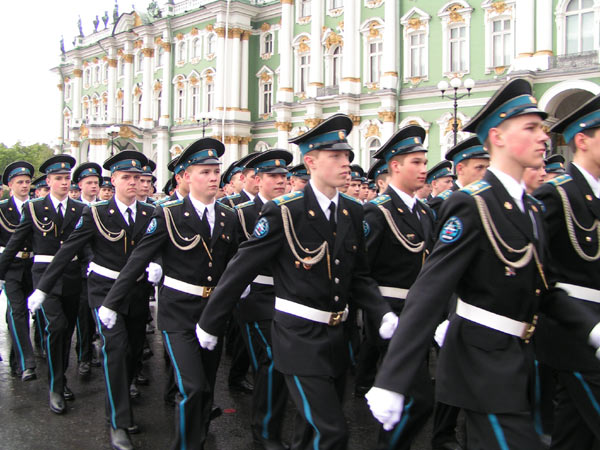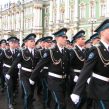
“Sparrows,” Semantic Ingenuity and the Paralysis of the “New Look” Russian Army
Publication: Eurasia Daily Monitor Volume: 8 Issue: 17
By:

Predictably, the Russian top brass declared the fall 2010 draft as a “success,” despite clear signs that it failed to meet its target. On January 20, Colonel-General Vasily Smirnov, the Deputy Chief of the General Staff and Chief of the Main Organizational and Mobilization Directorate (GUMO), claimed the draft was “fulfilled,” yielding “around 280,000” conscripts, while noting that only 308 had chosen alternative civilian service. Smirnov also suggested that the next fall draft must be prolonged to last from April 1 to August 31, instead of ending on July 15, saying legislation on this is currently being reviewed, adding it would “not lead to a longer term of military service.” Training sub-units would reduce the length of their courses from five to three months, preparing “specialists,” after which these would enter the units and for eight months “perfect their skills.” Across Russia, in 19 “academies” training is in progress to prepare “professional sergeants” to enter military units and Smirnov stated this would expand to involve 24 institutions (Interfax, January 20).
Smirnov’s comments were striking, not least for his inability to recall the precise figure to be conscripted in the latest draft (presidential decree 1191, September 30, 2010: 278,821 draftees) but for his departure from any semblance of supporting the “new look” army (Channel One TV, January 20; Ekho Moskvy, January 22). The manning crisis facing the defense ministry and the General Staff was papered over in an unconvincing attempt to resurrect Potemkin’s village. Yet, Smirnov’s reference to possible legislative changes on conscription highlights the planning paralysis gripping the reformers, as well as considering an emergency measure that may well denote the failure of the reform.
The proposed legislation “On the Introduction of Amendments to Article 25 of the Federal Law ‘On Military Obligations and Military Service,’” includes extending the spring draft until August 31, and reducing the fall draft by one month (delayed until November 1). This will allow the drafting of citizens into the Russian armed forces to occur throughout most of the year, or as some interpret the plans, increasing the number of drafting cycles to three instead of two. It will strengthen measures against draft-dodging, and most significantly allow a delay of five months to discharge those drafted in the spring; meaning these would serve for almost 18 months. According to the head of the government apparatus, Vyacheslav Volodin, agreement in principle has been reached on the proposals and it is expected that President Dmitry Medvedev will sign it into law by April 1, 2011 (Nezavisimoye Voyennoye Obozreniye, January 17).
Human rights groups seized upon a statement by General Smirnov that Russia has up to 200,000 draft-dodgers, and complained bitterly about his controversial assertion, which seemed aimed at deflecting criticism over the manning crisis. However, a critical commentary in Gazeta concluded that the authorities plan to increase the length of conscript service to 18 months (www.gazeta.ru, January 20). The semantic ingenuity involves extending the service of only those drafted in spring, since increasing the actual term of service would almost certainly signal the failure of the military reform. Nonetheless, if the law is passed and a portion of conscripts serve longer than others, the compromise implies that the trend is towards a rising term of service.
In the view of the United Russia Party deputies, Viktor Zavarzin, Mikhail Babich and Yury Savenko, who initiated the draft law, citizens will be sent into the Russian military three times annually. These deputies also affirmed that the measures will allow “the number of trained sergeants and specialist soldiers to be increased by one and one-half times” (Nezavisimoye Voyennoye Obozreniye, January 17).
Other observers were more skeptical. Communist Party Deputy, Admiral (retired) Vladimir Komoyedov, the former Commander of the Black Sea Fleet, complained it is impossible to train a competent specialist within three months, noting that foreign militaries take one to two years to achieve this. Moreover, Komoyedov said that appointing a young “vorobey” (sparrow) to sergeant posts is a “profanity to the country’s military organization.” The Chairman of the All-Russia Trade Union of Military Servicemen, Captain First Rank Oleg Shvedkov, concurs that three months is insufficient to train a qualified military specialist, especially for the navy. Shvedkov believes that draft boards should be permitted to call-up citizens all the year round as they are required, and that the authorities will eventually raise the term of service to two years (Nezavisimoye Voyennoye Obozreniye, January 17).
In Nezavisimoye Voyennoye Obozreniye on January 21, Lieutenant-General (retired) Valery Astanin, the former head of GUMO, assessed the “new look” soldiers. Astanin argued that the problem of the quality of recruits remains unresolved, advocating a three-phased program to remedy the manning crisis based on increasing the proportion of contract personnel and adopting a varied approach towards readiness levels. Astanin called for the genuine professionalization of the non-commissioned officer (NCO) cadre in meaningful numbers, rather than merely introducing some serving on a contract. Highlighting the weaknesses of a high turnover among conscript personnel serving in a tank unit, for instance, where conscripts are currently discharged twice per year, Astanin questioned why the reformers had underestimated the importance of the manpower issue. In his view, the answer lies in the Soviet and Russian military tradition of first prioritizing equipment and weapons, technique and only then considering how to develop manpower to exploit such potential. Historically, this has lowered the effectiveness of new weapons systems and in the initial period of war resulted in increasing the number of Russian causalities (Nezavisimoye Voyennoye Obozreniye, January 21).
Lengthening the term of service would signal greater reliance upon conscripts, but the deputies have probably satisfied the defense ministry by finding a form of words that masks the initial step towards rectifying the problem of depending upon soldiers and sergeants serving for twelve months. Reducing and intensifying the training of “specialists” to three months will certainly increase the numbers of “sparrows,” rather than improving combat readiness. But concealing, as far as possible, the implications of such emergency legislation is important in a year that will witness parliamentary elections and a decision on which of the ruling duumvirate will be Russia’s next president in 2012.




